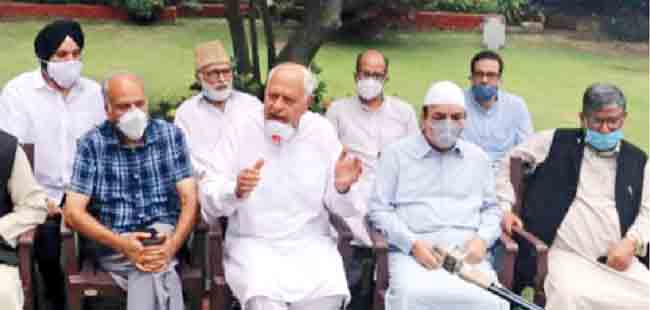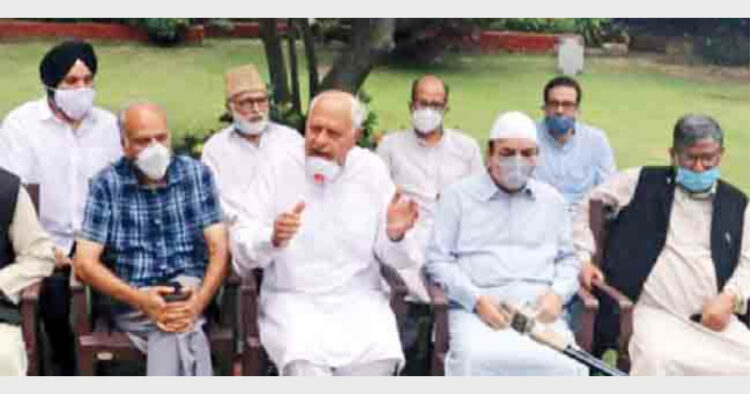The call for the restoration of Article 370 is no more than a whispering campaign is something that is not going unnoticed

National Conference President Farooq Abdullah addressing media on August 20, 2020
In the wake of the bifurcation of the state of Jammu & Kashmir (J&K) and abrogation of Article 370, the political structures that were aligned with separatism and soft separatism have been left without viable agendas.
Articulation on the subject can draw a lead from the Gupkar Declaration of August 4, 2019. The declaration named as such since it was taken at the Gupkar, Srinagar, the residence of Farooq Abdullah, was made by the senior Kashmiri leadership. The big names present were Mehbooba Mufti and Muzaffar Hussain Beg of PDP; Sajad Lone of JKPC; Taj Mohiuddin of JKPCC; M Y Tarigami of CPIM and the Abdullahs among many others. All participants resolved to protect and defend what they termed as “the identity, autonomy and special status of Jammu and Kashmir.”
Once the new status was put in place, it was insinuated, especially by Pakistan, that the detention of the senior leadership had stifled the political voice in Kashmir. Now, all leaders, except for Mehbooba Mufti, have been released. Farooq Abdullah was released on March 13 this year and Omar Abdullah on March 24. Even so, the inherent contradictions within the Kashmir leadership are palpable.
National Conference (NC) is witnessing an internal churning with its President Farooq Abdullah and Vice President Omar Abdullah giving different versions of the party’s strategy. “Now if you are asking me whether the NC will take this battle to the streets, I think the time for that has passed. When in the immediate aftermath of what happened on August 5, the battle didn’t go out into the streets, why would it go down to the streets one year later. So we will fight it politically, legally,” Omar said on June, 30. “I have been leader of the assembly of the state. In its time, the most empowered assembly. I cannot and will not be a member of what is now one of the most disempowered assemblies in the country. It’s as simple as that,” he stated about a month later in July.
Omar has earned the ire of his party through his aforementioned statements, whereby, he has confirmed that he would not be contesting elections till J&K is not given statehood and not mentioned the restoration of the special status under Article 370 as an essential caveat of the same decision. His father, Farooq Abdullah, is now in full damage control mode. An opportunity came his way when as he prepared to attend the monsoon session of the Parliament in his capacity of being a Member of Parliament from the Srinagar constituency. Before entering Parliament, he has reiterated the ‘Gupkar Declaration’ as the basis for launching what he called, “a struggle for the restoration of the special status of J&K.” How he puts his words into action in Parliament remains to be seen. Notably, Abdullah has said that he does not expect anything from the Parliament on Jammu and Kashmir and has pinned all hopes on the Supreme Court where the NC and other parties have challenged the revocation of Article 370. It is an indication that his interventions will be rather muted.
This disarray is quite visible in the Hurriyat too. Syed Ali Geelani resigned from all posts in June 2020. He listed a number of grouses against the organisation as reasons for his resignation. Significant among them was an inability to get together a movement against the change mentioned above the status of the state in August 2019.
It was against the backdrop of Geelani’s resignation that some Hurriyat leaders met in July under the chairmanship of Mirwaiz. These include Prof Abdul Gani Bhat, Maulana Abbas Ansari, Bilal Lone and a few others. Post the meeting; the Hurriyat stated that the Kashmir dispute has to be resolved peacefully among the three stakeholders—India, Pakistan and the people of J&K. What is significant here is that immediately after the resignation of Syed Geelani the Hurriyat has rid itself of his rigid stands on Azaadi (freedom) and amalgamation with Pakistan. The Hurriyat now realises that coming out of the existing morass of political irrelevance is possible only through a conciliatory approach that keeps open an option of dialogue with the centre at some time in the future. Hence, the Azaadi movement is all but history so far as the Hurriyat is concerned. There is also no talk of a restoration of Article 370.
The reality is that some segments of the Kashmiri leadership have been busy selling the very soul of Kashmir for the last 70 years. They leveraged the environment of violence created by foreign-sponsored terrorism to retain control over the people
The reality is that some segments of the Kashmiri leadership have been busy selling the very soul of Kashmir for the last 70 years. The elements have been acting as agents of forces that had inimical designs towards the region and its people. They leveraged the environment of violence created by foreign-sponsored terrorism to retain control over the people. They fed a doomsday narrative to successive governments in the centre and paralysed them. As a result, hard decisions that were essential for the complete integration of the state with the nation and very much in the good interest of the people were not taken. They further used the special status to keep the people away from India and in the absence of accountability bred the worst form of corruption in the state. The lack of good governance kept the people in a constant state of agitation.
The dynamic changes after the abrogation of Article 370 have exposed the nexus that was being played by it. The environment has been further invigorated by the almost complete decimation of the cult of terrorism thorough relentless effort of the security forces with the Indian Army in the forefront.
The fear of their dark web getting exposed is now eating up the self-appointed, self-serving so-called leadership of Kashmir. It is now “clutching at straws.” That the call for the restoration of Article 370 is no more than a whispering campaign is something that is not going unnoticed.
(The writer is a political commentator, columnist and author)














Comments